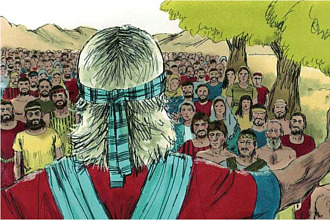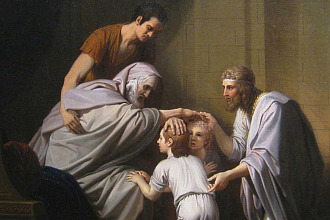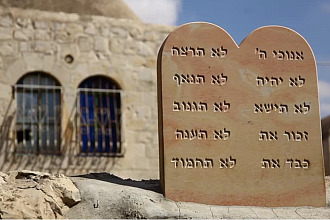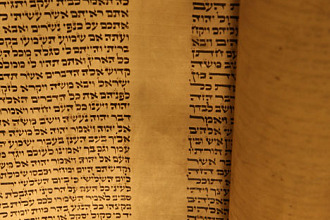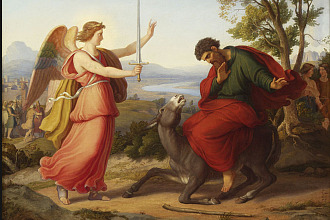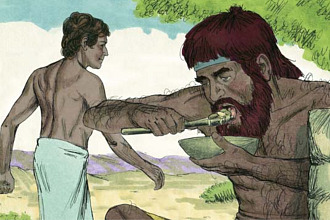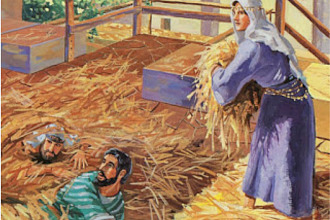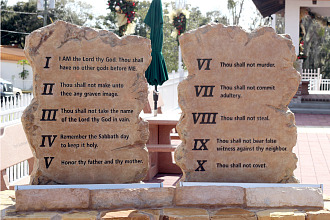Parasha for the Week: Vayishlach: Genesis 32:4 - 36:43.
Aftarah for the Week: Obadiah 1:1 - 21.
Besorat Yeshua: Mark 12:6 - 17.
Overview
Returning home, Yaakov finds out that Esau is approaching with an army of 400. Yaakov divides the camps, prays for assistance, and sends tribute to Esau.
That night Yaakov is left alone and wrestles with a man (who turns out to be God). Yaakov emerges victorious but is left with an injured sinew in his thigh. The Angel tells him that his name in the future will be Yisrael, signifying that he has prevailed against man and the God.
Yaakov and Esau meet and are reconciled.
Sh’chem, a Caananite prince, abducts and violates Dina, Yaakov’s daughter.
In return for Dina’s hand in marriage, the prince and his father suggest that Yaakov and his family intermarry and enjoy the fruits of Caananite prosperity.
Yaakov’s sons trick Sh’chem and his father by feigning agreement; however, they stipulate that all the males of the city must undergo brit mila (circumcision). Shimon and Levi, two of Dina’s brothers, enter the town and execute all the males who were weakened by the circumcision.
G-d commands Yaakov to go to Beit-El and build an altar.
His mother, Rivka’s nurse Devorah, dies and is buried below Beit-El.
While traveling, Rachel goes into labor and gives birth to Binyamin, the twelfth of the tribes of Israel. She dies in childbirth and is buried on the Beitlechem road.
Yitzchak passes away at the age of 180 and is buried by his sons Esav and Yaakov.
Yaakov Saves His Family
After spending 20 years in his father-in-law Lavan’s house, Yaakov and his family leave to go back to his parents, Yitzchak and Rivkah. On the way, he is told that his brother Esau, who still hates him for taking his father’s blessings, is coming with four hundred men to kill him.
Yaakov Was Afraid
The Torah states: And Jacob was greatly afraid, and he was distressed (Gen. 32:8). Rashi said in Midrash Rabba, He was afraid that he might be killed, and distressed that he might kill. Yaakov said: “I am unworthy of the least of all the mercies, and of all the truth, which You have shown Your servant” (Genesis 32:11). Every kindness bestowed by G-d upon a person should cause him to be exceedingly humble. For a Divine kindness is an expression of “His right hand does embrace me.” G-d is literally bringing the person closer to Himself. The closer a person is to G-d, the greater the humility this should evoke in him; for since “all before Him is as naught,” the more “before Him” a person is, the more “as naught” does he perceive himself to be.
Israel
Yaakov wrestles with the man through the night. When Yaakov realizes that it is not a man that he is wrestling with but God he grabs hold and says “I will not let you go until you bless me.” Yaakov is told that He will no longer be called Yaakov (deceiver) but Israel (prince with God, overcomer with God). Jacob names the place Peniel (face of God) because he been face to face with God and was not destroyed. Yaakov, now Israel, prefigures the Messiah the ultimate Israel, the ultimate Overcomer, the Prince of Peace.
Prayer
This parable teaches the importance of daily prayer. A father had a child whom he loved dearly. Each day, the child came to his father for his daily allowance. Even when the boy grew older and lived on his own he visited his father every day and received a daily allowance.
Once, the son said to his father, “Wouldn’t it be easier if you gave me a month’s allowance at one time?” The father agreed and as a result, the son began coming once a month. Eventually, the son asked his father to give him the full allowance for the entire year. When the year was up, his father said, “From now on, I will go back to giving you your needs daily.” When the son protested, the father explained, “There is no greater pleasure for me than to see you and talk to you. When you needed me every day, you came to me daily, but as soon as I gave you your needs for the month or for the year, you completely forgot about me until the next time you required something. It is better for both of us if you come every day!
HAFTARAH Obadiah 1:1 - 21
Parasha: We continue to read in this parasha about the conflict between Yaakov and Esau. “Now Jacob looked up and saw Esau coming, and four hundred men with him. So he divided the children among Leah and Rachel and the two maids” (Genesis 33:1). Esau, became the father of the Edomites, and Jacob the father of Israel.
Haftarah: The book of Obadiah is about the Edomites and the Israelites. The Edomites and the Israelites have been in conflict since they were conceived in their mother’s womb: “The children struggled together within her; and she said, “If it is to be this way, why do I live?” (Ge 25:21-23). The Lord is very strongly against Edom: “On that day, says the LORD, I will destroy the wise out of Edom, and understanding out of Mount Esau. Your warriors shall be shattered, O Teman, so that everyone from Mount Esau will be cut off” (Obadiah 8,9). Some people can think that is not fair, but we have to remember what happened in history.
- Edom’s refusal to allow Israel to pass through their land when we left Egypt (Nu 20:14-21)
- Doeg, the Edomite’s conspiracy against David when Saul was out to kill David (1Sa 21-22)
- The confederacy of Edomites and the Ishmaelites against Israel (Ps 83)
- The armies of Edom, Moab, and Ammon against King Jehoshaphat and Jerusalem (2Ch 20)
- The attack on Judah by the Edomites during the reign of King Ahaz (2Ch 28:17)
- The desecration of Jerusalem by the Edomites (Ob 1:10-16)
Besorat Yeshua Mark 12:6 - 17
Parasha: In the Torah we have the opposition between Yaacov and Esau and in the Haftara we have the opposition between Edom and Israel “Esau hated Jacob because of the blessing with which his father had blessed him, and Esau said to himself, “The days of mourning for my father are approaching; then I will kill my brother Jacob” (Genesis 27:41).
Besorah: Opposition by the leaders against the Mashiach Yeshua: “When they realized that he had told this parable against them, they wanted to arrest him” (Mark 12:12).
Parasha: Esau, became the father of the Edomites, and Jacob the father of Israel. Then very soon the book of Genesis and the rest of the bible will be almost exclusively the story of the children of Yaakov who are God’s people.
Besorah: This part of the Besorah, is painful because we see the leaders progressively taking position against Yeshua. Yeshua is the embodiment of what Israel was to be. “Then they sent to him some Pharisees and some Herodians to trap him in what he said” (Mark 12:13).
Yaakov has been tested by the Lord, by the angel, by Esau; it is normal then in this portion of the Besorah that Yeshua is tested. But he avoids the trap and answer rightly: “Give to the emperor the things that are the emperor’s, and to God the things that are God’s.” And they were utterly amazed at him” (Mark 12:17).









